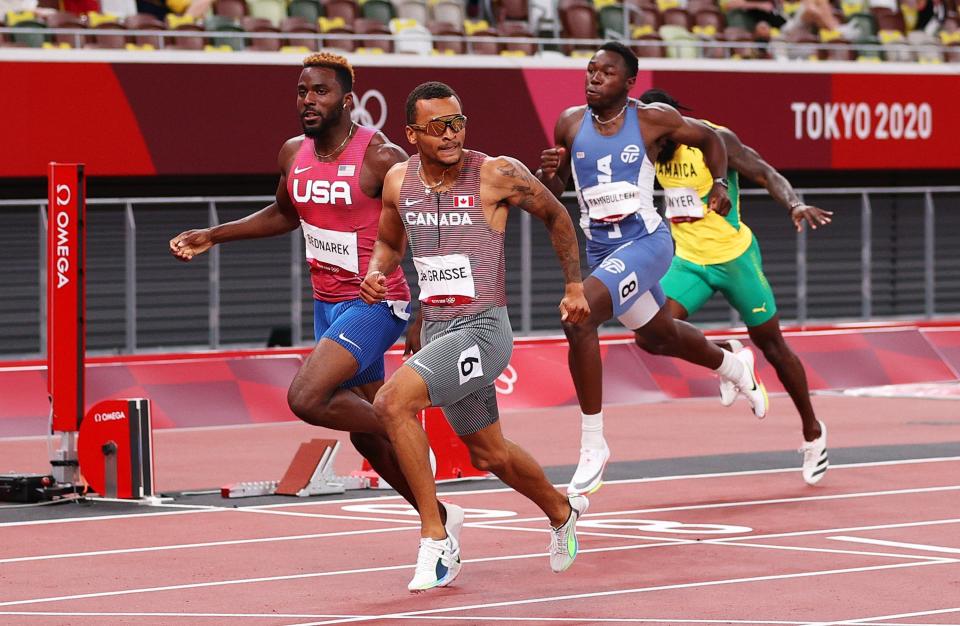Tokyo Olympics: Andre de Grasse keeps the faith to finally become a champion with 200m gold
As Andre de Grasse celebrated, he told a prayer and raised a finger to the heavens. He is a man of deep faith with an unfaltering trust in God; at times too trusting. He spent years thinking natural talent was enough, not taking his first Games in Rio seriously and living an indulgent life of fast food and late nights.
But a switch flicked two years ago. He changed coach, got disciplined and came to Tokyo driven to succeed, and once his innate talent was channelled by dedication it was only natural that after so many near misses he should finally become a champion. Now De Grasse understood: God may have made a plan but only he could deliver it.
After two bronze and a silver in Rio, bronze and silver at the 2019 worlds, and bronze again in the 100m on Sunday, the 26-year-old Canadian’s first taste of global gold was finally won by the narrowest of margins, setting a national record 19.62 to push out the fancied American trio to two, three and four. The 22-year-old Kenny Bednarek ran him closest to take silver in 19.68, with world champion Noah Lyles settling for bronze in 19.74. Seventeen-year-old Erriyon Knighton finished fourth, but his time will come.
“I’ve been through so much in these five years, on the track and off the track,” De Grasse said. “I’ve become a grown man. In 2016 I was a kid, just trying to go out and make it happen. Now I can come away with medals, gold medals, just to show I’m back.”
Gold didn’t come easily. De Grasse has a fast finish but he had to put himself in position to deliver it. Starting from lane six he could see Bednarek on his outside and attacked the bend hard, transitioning into the straight on the American’s heel. That was the graft bringing its rewards, all the technical training, the conditioning to have his body endure the pressures of sprinting a bend. Then his gift took over.
De Grasse was a skinny 12-year-old boy when he first tried track, winning a race in baggy basketball clothes from a standing start in 10.9 seconds. Prominent coach Tony Sharpe was watching and was blown away by the talent he had just uncovered, telling De Grasse he could be “one of the fastest guys in the world”.
It is something that comes naturally when he lets his legs take over. His slight build makes it look like he’s gliding across the track, and that was how it felt to watch him gradually reel in and move past Bednarek with 50m to go. Lyles tried to follow but faded at the finish.

De Grasse’s wife Nia Ali is a 100m hurdles world champion, and now finally he might lay claim to being the most successful athlete in his own house. “I was so happy for her when she won the World Championships in Doha, the first to bring home a gold medal. It really motivated me and inspired me to see how hard she works: I’ve got to go out and do this for you and show I can bring a gold medal home too. I can’t wait to go home.”
It has been a journey since Rio: a terrible hamstring tear, twice, and genuine fears of never competing again. Then a change of lifestyle, no more drive-thru burgers on the way home from training, and he found fitness. A change of coach, recuperation, and he found some confidence too. In the interim he became a father. Life got “serious”, he says.
Floridian coach Rana Reider helped him channel his talent, to know when to turn it on and off, when to strain every sinew and when to relax back into his stride like an armchair. De Grasse’s naturally laidback state helps in this regard: few other athletes try to make themselves feel more nervous on the start line.
“My injuries are behind me. It’s experience, it’s definitely the experience. I knew the schedule would be tough, two rounds of the 200m on one day, I have to conserve energy, I can’t blast out in the first round. I settled for third [in the heats]. Experience helped me a lot. I’ve been through this before, Rio and Doha, so I know what to expect.”
Bednarek is 22 and he will have many more chances on this stage. He led after 100m but couldn’t hold on and he will learn from the tension which took over his upper body. A silver medal at his first Olympics is great reward. Lyles will be more frustrated: at 24, as reigning world champion and winner of the US trials, he was the favourite. His personal best 19.50 would have been good enough for gold but he hasn’t shown that form in Tokyo.
Most eye-catching this week has been the teenager Knighton, who truly could be the next Usain Bolt. If that sounds like hyperbole then consider that he has already blown away two of Bolt’s long-standing junior records, and that Bolt won his first Olympic title aged 22 – Knighton has another Games before then and could conceivably win medals in the next four. It might be a couple of decades yet before we start searching for the next Erriyon Knighton.
Read More
Tokyo 2020 LIVE: Team GB win sailing gold as Ben Whittaker gets silver
How much do Olympic athletes win for gold, silver and bronze medals?

 Yahoo News
Yahoo News 